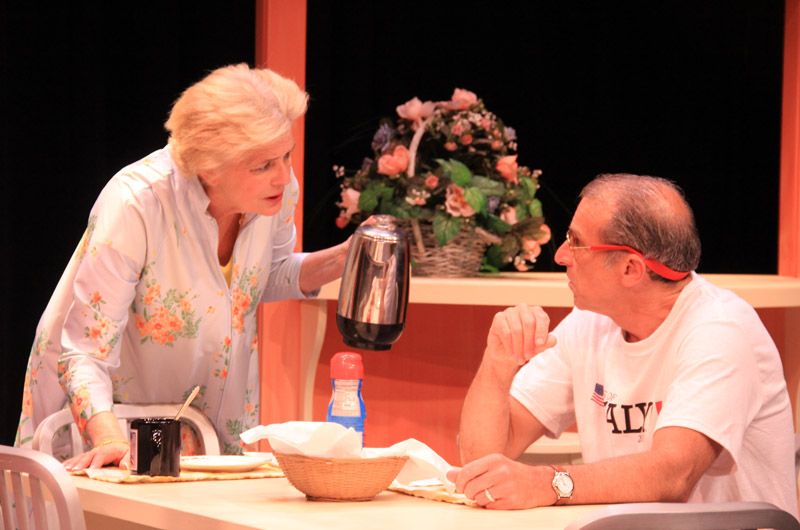Arnie Reisman’s dark comedy Not Constantinople is a play that evokes large themes — nostalgia, aging, love and morality. At the center of the story is a wife’s love for her husband, and the latent morality that can be found in even the most cold-hearted humans.
The play opened on June 2 at The Martha’s Vineyard Playhouse. Remaining dates are June 17-June 20, all shows starting at 7:30 p.m.
Set in the present day, Mr. Reisman’s script was inspired by a New York Times article about former Mafiosi, who as they aged began to literally lose their minds. The article tracked a couple that had been assigned to a witness protection program in Florida, and ended with its subject saying, “I hope I get called to testify before I am a babbling idiot.”
Not Constantinople takes this premise and runs with it, examining how exactly such a situation would unfold. After the mob kills his best friend, Paul Trent, a former mafia bookkeeper, turns them in, and along with his wife, Gloria, waits for his turn to testify against them in a witness protection site located in a gated community in Boca Raton, Fla. Protracted court proceedings extend the length of their stay in the program, and in the retirement community.
“I don’t think I can take that much retirement,” Paul says. “Or Florida.”
Meanwhile, the mob puts a hit out on Paul, and the play follows the evolution of the relationship between Paul and Gloria and the hit-couple assigned to kill them, Lee Diamond and Stacey Collins. Throughout the play, Mr. Reisman’s affinity for language is clear. He emphasizes singular words and phrases and there are double entendres throughout the two-act play.
The first scene takes place on a makeshift squash court. Squash racquets and the sound of a ball being smacked against a wall serve as visual and audio aids for the audience. The match is played between Paul and Lee, and the court is turned to throughout the play as a site of interaction between the two men.
The sets don’t change much but the actors’ clothes do, and there are many references to the past shared between the couples.
“Nuts are healthy,” says Lee. “How did they become lethal? Nothing is what it used to be,” he says.
Paul is reluctant to embrace technology. “DVR, GPS, remember when we used to use real words?” he asks.
“Nothing stands still, everything changes,” adds Stacey over dinner with Lee, Paul and Gloria. Gloria chimes in and recites the lyrics of the 1950s song Not Constantinople. She ends on the refrain, ”So take me back to Constantinople/ No, you can’t go back to Constantinople/ Been a long time gone, Constantinople/ Why did Constantinople get the works?/ That’s nobody’s business but the Turks.”
When Paul is diagnosed with early-onset Alzheimer’s disease, his hit-man, Lee, develops a conscience. Paul can’t keep track of his keys or his plants while he gardens; a newfound hobby since he’s been in Florida. He can’t remember what card game he’s playing, or that his two children are grown and no longer live with him.
The play turns to the ethics of taking the life of someone who has been rendered harmless. Lee hesitates at killing someone who no longer represents a threat. But Gloria, who has discovered Lee’s identity, tries to persuade Lee to go through with the hit and take her husband out of his misery.
“Wouldn’t you like to checkout before the hotel is demolished?” Gloria asks. The hit on Paul turns into a mission of mercy.
The play ends in much the same way as the article does. After appealing to Lee, Gloria reasons to the U.S. Marshal involved in the case that the outcome was the most desirable for her husband.
”By the time he’d be called to testify, he couldn’t,” she says.





Comments
Comment policy »